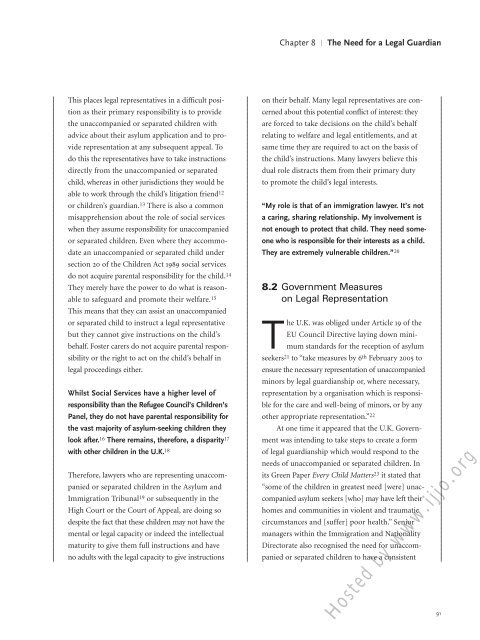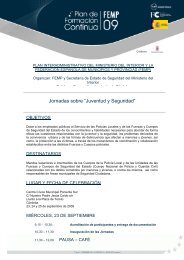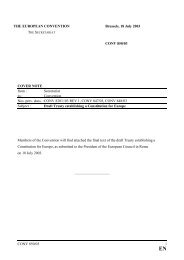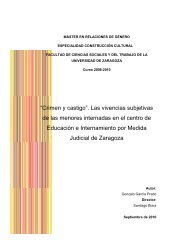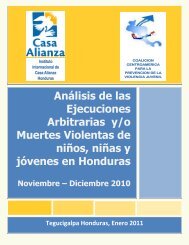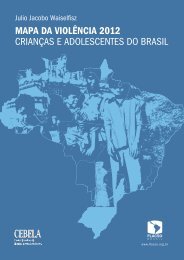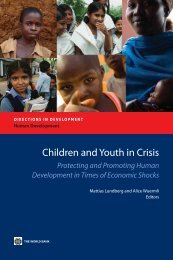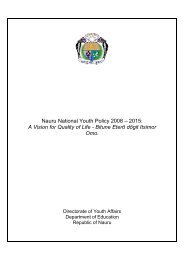Hosted by www.ijjo.org
Hosted by www.ijjo.org
Hosted by www.ijjo.org
Create successful ePaper yourself
Turn your PDF publications into a flip-book with our unique Google optimized e-Paper software.
Chapter 8 | The Need for a Legal Guardian<br />
This places legal representatives in a difficult position<br />
as their primary responsibility is to provide<br />
the unaccompanied or separated children with<br />
advice about their asylum application and to provide<br />
representation at any subsequent appeal. To<br />
do this the representatives have to take instructions<br />
directly from the unaccompanied or separated<br />
child, whereas in other jurisdictions they would be<br />
able to work through the child’s litigation friend 12<br />
or children’s guardian. 13 There is also a common<br />
misapprehension about the role of social services<br />
when they assume responsibility for unaccompanied<br />
or separated children. Even where they accommodate<br />
an unaccompanied or separated child under<br />
section 20 of the Children Act 1989 social services<br />
do not acquire parental responsibility for the child. 14<br />
They merely have the power to do what is reasonable<br />
to safeguard and promote their welfare. 15<br />
This means that they can assist an unaccompanied<br />
or separated child to instruct a legal representative<br />
but they cannot give instructions on the child’s<br />
behalf. Foster carers do not acquire parental responsibility<br />
or the right to act on the child’s behalf in<br />
legal proceedings either.<br />
Whilst Social Services have a higher level of<br />
responsibility than the Refugee Council’s Children’s<br />
Panel, they do not have parental responsibility for<br />
the vast majority of asylum-seeking children they<br />
look after. 16 There remains, therefore, a disparity 17<br />
with other children in the U.K. 18<br />
Therefore, lawyers who are representing unaccompanied<br />
or separated children in the Asylum and<br />
Immigration Tribunal 19 or subsequently in the<br />
High Court or the Court of Appeal, are doing so<br />
despite the fact that these children may not have the<br />
mental or legal capacity or indeed the intellectual<br />
maturity to give them full instructions and have<br />
no adults with the legal capacity to give instructions<br />
on their behalf. Many legal representatives are concerned<br />
about this potential conflict of interest: they<br />
are forced to take decisions on the child’s behalf<br />
relating to welfare and legal entitlements, and at<br />
same time they are required to act on the basis of<br />
the child’s instructions. Many lawyers believe this<br />
dual role distracts them from their primary duty<br />
to promote the child’s legal interests.<br />
“My role is that of an immigration lawyer. It’s not<br />
a caring, sharing relationship. My involvement is<br />
not enough to protect that child. They need someone<br />
who is responsible for their interests as a child.<br />
They are extremely vulnerable children.” 20<br />
8.2 Government Measures<br />
on Legal Representation<br />
The U.K. was obliged under Article 19 of the<br />
EU Council Directive laying down minimum<br />
standards for the reception of asylum<br />
seekers 21 to “take measures <strong>by</strong> 6 th February 2005 to<br />
ensure the necessary representation of unaccompanied<br />
minors <strong>by</strong> legal guardianship or, where necessary,<br />
representation <strong>by</strong> a <strong>org</strong>anisation which is responsible<br />
for the care and well-being of minors, or <strong>by</strong> any<br />
other appropriate representation.” 22<br />
At one time it appeared that the U.K. Government<br />
was intending to take steps to create a form<br />
of legal guardianship which would respond to the<br />
needs of unaccompanied or separated children. In<br />
its Green Paper Every Child Matters 23 it stated that<br />
“some of the children in greatest need [were] unaccompanied<br />
asylum seekers [who] may have left their<br />
homes and communities in violent and traumatic<br />
circumstances and [suffer] poor health.” Senior<br />
managers within the Immigration and Nationality<br />
Directorate also recognised the need for unaccompanied<br />
or separated children to have a consistent<br />
<strong>Hosted</strong> <strong>by</strong> <strong>www</strong>.<strong>ijjo</strong>.<strong>org</strong><br />
91


